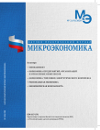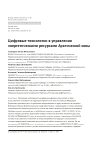Digital technologies in the management of energy resources in the Arctic zone
DOI: 10.33917/mic-6.119.2024.71-80
The article substantiates the necessity of introducing digital technologies based on artificial intelligence in the Arctic Zone of the Russian Federation. According to the methodology of the World Bank, the indicators of energy production and consumption per capita are important characteristics that reflect not only the dynamics of economic development of regions, but also the quality of life of the population. This study analyzes energy production and consumption in the period from 1990 to 2023, including four regions, the territories of which are fully included in the Arctic Zone of the Russian Federation. The article touches upon the impact of modern technologies based on artificial intelligence (AI) on energy consumption in the future, the use of predictive analytics for sustainable operation of energy systems in the Arctic. It also suggests the possibility of improving the energy efficiency of data centers in the Arctic zone, taking into account the use of natural cooling of servers.
References:
1. On the Strategy for the Development of the Arctic Zone of the Russian Federation and National Security for the Period until 2035: Presidential Decree of the Russian Federation of October 26, 2020. № 645. URL: https://www.garant.ru/products/ipo/prime/doc/74710556/?ysclid=m37uq9lmr885155307
2. On the Fundamentals of State Policy of the Russian Federation in the Arctic for the period until 2035: Presidential Decree of the Russian Federation of March 5, 2020. № 164.
3. The Arctic Council. Russian Chairmanship. URL: https://as.arctic-russia.ru/useful/
4. EMISS. Government statistics. URL: https://www.fedstat.ru/indicator/55089
5. What the Arctic will be like in 2035. URL: https://morvesti.ru/analitika/1692/87581/?ysclid=m38p5qacy4456766395.
6. Babkinа L., Skotarenko, O., Kuznetsova E., Khatsenko E. Digitalization of Electrici-ty Suppliers’ Activities in the Arctic Zone. 5th International Scientific Conference on Digital Economy and Finances. St. Petersburg, Russian Federation, 2022. pp. 439–450.
7. Regions of Russia. Socio-economic indicators – 2023. Official website of the Federal State Statistics Service. URL: https://rosstat.gov.ru/folder/210/document/13204
8. E2nergy. An industry media resource created to cover events and trends in the energy industry of Eurasia and the world. URL: https://eenergy.media/about
9. On the development of artificial intelligence in the Russian Federation (together with the «National Strategy for the Development of Artificial Intelligence for the period up to 2030»): Decree of the President of the Russian Federation as amended on 02/15/2024 № 490. URL: https://www.consultant.ru/document/cons_doc_law_335184/
10. Ministry of Digital Development, Communications and Mass Media of the Russian Federation. URL: https://digital.gov.ru/
11. Roadmap for the development of «end-to-end» digital technology «Neurotechnology and artificial intelligence». URL: https://digital.gov.ru/uploaded/files/07102019ii.pdf
12. Kalmatsky M., Uzbekova A. A national project on the digital transformation of the state is being launched in Russia. RBC. URL: https://rg.ru/2024/05/21/kakie-nashi-kody.html
13. Ampilov Y. P. Energy development of the Russian Arctic in the era of energy transition. Energeticheskaya politika. 2022;1:30-43.
14. AI increases electricity consumption in Russia and the world. Media resource INVOLTA. 04.08.2024. URL: https://involta.media/ai-i-robototehnika/ii-uvelichivaet-potreblenie-elektroenergii-v-rossii-i-mire
15. The heat from the Google data center will warm 80% of the residents of the Finnish city. RBC. URL:



